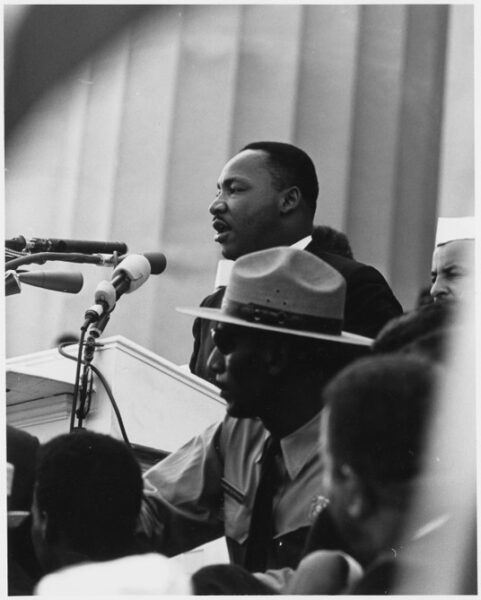
Asa Philip Randolph, 1963
March on Washington, August 28, 1963, Leads to the First National Anti-Discrimination Protection
Over 200,000 demonstrators took part in the August 28, 1963 March on Washington for Jobs and Freedom. The event’s impact – famously known for Dr. Martin Luther King Jr.’s “I Have a Dream” speech – lead to the landmark Civil Rights Act of 1964.
The protest had a WW II precursor. In 1941, A. Philip Randolph, founder of the Brotherhood of Sleeping Car Porters, called for a march on D.C. to protest employment discrimination against African Americans in the defense industry. The specter of 100,000 marchers descending on the capital pressed President Roosevelt to issue Executive Order 8802, creating the Fair Employment Practices Commission to investigate such racial inequality. In response, Randolph called off the march.
Mr. Randolph was instrumental in conceiving the 1963 March. That spring, he sought Dr. King’s support for a planned June march “for Negro job rights.” In May, at the height of the Birmingham Campaign for equal racial access to that city’s commercial businesses, King joined Randolph and other Black leadership to call for such a move upon Washington later that year, eventually scheduled for August 28. Stated goals included passage of a comprehensive civil rights bill to ban segregation in restaurants, transportation and all other public accommodations; voting rights protections; public school desegregation; a federal works employment training program; and “a Federal Fair Employment Practices Act barring discrimination in all employment.”
Thanks to the courage of the many who stood up to confront non-violently the widespread hatred and intolerance of the time, the resulting 1964 Civil Rights Act remains America’s principal anti-discrimination law, prohibiting segregation in public places and banning employment discrimination on the basis of race, color, religion, sex or national origin.
February 6, 2020


Dr. Martin Luther King, Jr.
Civil Rights March on Washington, D.C.
August 28, 1963
